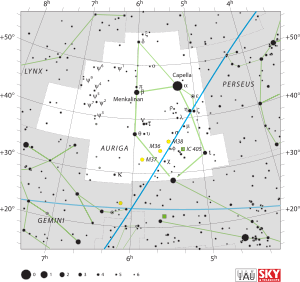Psi3 Aurigae
 | |
| Observation data Epoch J2000.0 Equinox J2000.0 (ICRS) | |
|---|---|
| Constellation | Auriga |
| Right ascension | 06h 38m 49.18001s[1] |
| Declination | +39° 54′ 09.2150″[1] |
| Apparent magnitude (V) | +5.20[2] |
| Characteristics | |
| Spectral type | B8 III[3] |
| U−B color index | −0.38[4] |
| B−V color index | −0.07[4] |
| Astrometry | |
| Radial velocity (Rv) | +9.0±4.2[5] km/s |
| Proper motion (μ) | RA: +27.19[1] mas/yr Dec.: +16.82[1] mas/yr |
| Parallax (π) | 6.34 ± 0.20[1] mas |
| Distance | 510 ± 20 ly (158 ± 5 pc) |
| Absolute magnitude (MV) | −2.71[6] |
| Details | |
| Radius | 4.2[7] R☉ |
| Luminosity | 1,624[6] L☉ |
| Temperature | 13,361±83[8] K |
| Rotational velocity (v sin i) | 118[8] km/s |
| Other designations | |
| Database references | |
| SIMBAD | data |
Psi3 Aurigae, Latinized from ψ3 Aurigae, is the Bayer designation for a single,[10] blue-white hued star in the northern constellation of Auriga. It is dimly visible to the naked eye with an apparent visual magnitude of +5.20.[2] Based upon an annual parallax shift of 2.38 ± 0.39 mas as seen from the Earth,[1] it is approximately 1,370 light-years (420 parsecs) distant from the Sun.
This is a B-type giant star with a stellar classification of B8 III.[3] It has about 4.2[7] and is spinning with a relatively high projected rotational velocity of 118 km/s.[8] The star is radiating 1,624[6] times the Sun's luminosity from its photosphere at an effective temperature of 13,361 K.[8]
References
- 1 2 3 4 5 6 van Leeuwen, F. (2007), "Validation of the new Hipparcos reduction", Astronomy and Astrophysics, 474 (2): 653–664, arXiv:0708.1752, Bibcode:2007A&A...474..653V, doi:10.1051/0004-6361:20078357.
- 1 2 Eggleton, P. P.; Tokovinin, A. A. (September 2008), "A catalogue of multiplicity among bright stellar systems", Monthly Notices of the Royal Astronomical Society, 389 (2): 869–879, arXiv:0806.2878, Bibcode:2008MNRAS.389..869E, doi:10.1111/j.1365-2966.2008.13596.x.
- 1 2 Cowley, A. (November 1972), "Spectral classification of the bright B8 stars", Astronomical Journal, 77: 750–755, Bibcode:1972AJ.....77..750C, doi:10.1086/111348.
- 1 2 Crawford, D. L. (February 1963), "U, b, v, and Hβ Photometry for the Bright B8- and B9-TYPE Stars", Astrophysical Journal, 137: 530, Bibcode:1963ApJ...137..530C, doi:10.1086/147526.
- ↑ de Bruijne, J. H. J.; Eilers, A.-C. (October 2012), "Radial velocities for the HIPPARCOS-Gaia Hundred-Thousand-Proper-Motion project", Astronomy & Astrophysics, 546: 14, arXiv:1208.3048, Bibcode:2012A&A...546A..61D, doi:10.1051/0004-6361/201219219, A61.
- 1 2 3 Anderson, E.; Francis, Ch. (2012), "XHIP: An extended hipparcos compilation", Astronomy Letters, 38 (5): 331, arXiv:1108.4971, Bibcode:2012AstL...38..331A, doi:10.1134/S1063773712050015.
- 1 2 Pasinetti Fracassini, L. E.; et al. (February 2001), "Catalogue of Apparent Diameters and Absolute Radii of Stars (CADARS)", Astronomy and Astrophysics (Third ed.), 367: 521–524, arXiv:astro-ph/0012289, Bibcode:2001A&A...367..521P, doi:10.1051/0004-6361:20000451.
- 1 2 3 4 Paunzen, E.; et al. (2005), "An empirical temperature calibration for the Δa photometric system . I. The B-type stars", Astronomy and Astrophysics, 444 (3): 941–946, arXiv:astro-ph/0509049, Bibcode:2005A&A...444..941P, doi:10.1051/0004-6361:20053546.
- ↑ "tet Hyi". SIMBAD. Centre de données astronomiques de Strasbourg. Retrieved 2017-10-13.
- ↑ Eggleton, P. P.; Tokovinin, A. A. (September 2008), "A catalogue of multiplicity among bright stellar systems", Monthly Notices of the Royal Astronomical Society, 389 (2): 869–879, arXiv:0806.2878, Bibcode:2008MNRAS.389..869E, doi:10.1111/j.1365-2966.2008.13596.x.
External links
This article is issued from
Wikipedia.
The text is licensed under Creative Commons - Attribution - Sharealike.
Additional terms may apply for the media files.